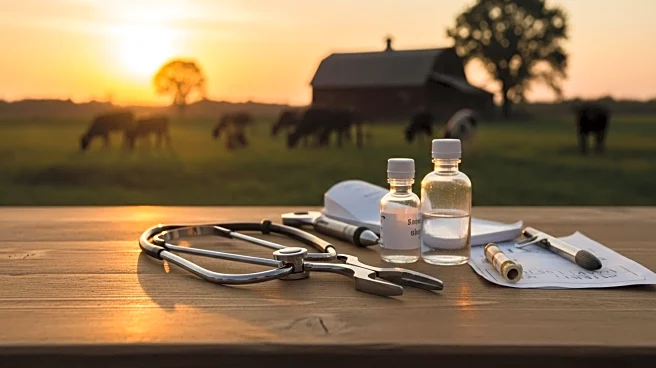What's Happening?
Farmers and livestock breeders from Larissa, central Greece, met with the Ministry of Rural Development to discuss the ongoing smallpox outbreak affecting sheep and goats. The outbreak has led to the culling of over 35,000 animals since August, with 1,290 cases reported. The government has opted against a universal lockdown, instead implementing intensified controls coordinated by the Rural Development Ministry, police, and regional authorities. These measures aim to crack down on concealed cases, illegal animal slaughter, and transport, enforcing penalties under European regulations. Despite the meeting, farmers expressed disappointment over the lack of a clear payment schedule and additional support measures. Deputy Prime Minister Kostis Hatzidakis emphasized the importance of processing subsidies and compensation quickly to prevent the situation from worsening.
Why It's Important?
The smallpox outbreak poses significant challenges to the agricultural sector, particularly affecting farmers and livestock breeders who rely on sheep and goats for their livelihood. The government's decision to avoid a lockdown reflects a balance between controlling the outbreak and minimizing economic disruption. The intensified controls and penalties aim to prevent further spread, but the lack of immediate financial support could strain farmers already facing losses. The situation underscores the need for efficient government response and support mechanisms to sustain the agricultural industry during health crises. The broader impact includes potential disruptions in the supply chain and increased pressure on rural economies.
What's Next?
Farmers plan to reconvene in Larissa and engage in discussions with peers nationwide to organize mobilizations, seeking more substantial support from the government. The Ministry of Rural Development will continue to enforce strict measures to contain the outbreak, while initial subsidy payments have begun, with more expected in the coming days and weeks. The government will need to address farmers' concerns promptly to prevent further dissatisfaction and potential protests. Monitoring the outbreak's progression and adjusting strategies will be crucial in managing the crisis effectively.
Beyond the Headlines
The outbreak highlights the vulnerability of agricultural sectors to infectious diseases and the importance of robust health and safety protocols. It raises ethical considerations regarding animal welfare and the balance between economic interests and public health. Long-term implications may include increased investment in disease prevention and control measures, as well as potential shifts in farming practices to mitigate future risks.









